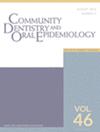While physical health status is known to impact social functioning, a growing literature suggests that social well-being may affect oral health. This investigation evaluated whether self-perceived quality of social roles, activities and relationships (social well-being) influences gingival inflammation.
Data were from the Population Assessment of Tobacco and Health Study, a nationally representative cohort of US adults, biennial waves 4 (2017) to 6 (2021). Social well-being was derived from the validated PROMIS Global-10 survey instrument, categorized for this longitudinal analysis as high, moderate or low. The main outcome was incident self-reported gum bleeding (dichotomous, proxy for gingivitis). Survey-weighted logistic regression modelling adjusted for overall health status, sociodemographic (e.g. age, sex, race/ethnicity), socioeconomic (e.g. income, education) and behavioural (e.g. tobacco, alcohol) confounders and was used to predict marginal mean gum bleeding incidence.
Cross-sectionally at wave 4 (N = 23 679), gum bleeding prevalence was higher along a stepwise gradient of decreasing satisfaction with social activities and relationships (extremely satisfied: 20.4%; not at all: 40.1%). Longitudinally, among participants who had never reported gum bleeding through wave 4 (N = 9695), marginal predicted new gum bleeding at wave 6 was greater with each category of lower wave 4–5 social well-being (high: 7.6%; moderate: 8.6%; low: 12.4%). Findings were robust to alternative model specifications. Results should be interpreted considering study limitations (e.g. potential unmeasured confounding; outcome by self-report).
Social functioning may affect physical health. Specifically, social roles, activities and relationships may influence inflammatory oral conditions, like gingivitis. Confirmatory research is warranted, along with policies and interventions that promote social well-being.


